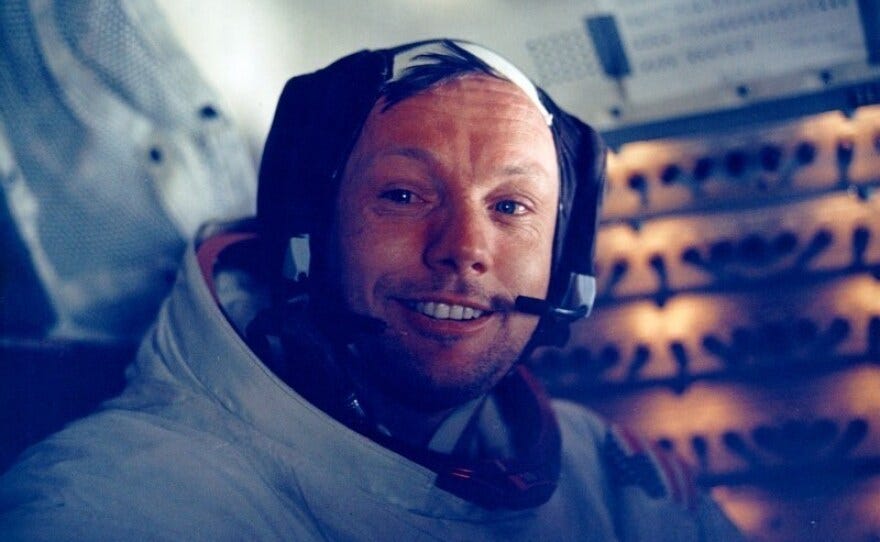Dear Neil
I wonder how many letters you received over the years. Even writing this feels like giving you yet more of the attention you never wanted. I’ve always thought there was something perfect about the fact that the man who carried out the most audacious act in human history was also the man who least sought to gain any notoriety from it. That’s probably why you pulled it off. Anyone more conceited would probably still be up there. But fate decreed that it was to be you and the world should be thankful for it.
Your name was so engrained into the culture in which I was born that it was hard not think of you as some mythic being, like Odysseus or Icarus. But your wings rarely melted. And on the odd occasion they did, you were always quick-witted enough to get out of it. A less humble person would likely have crashed and burned. In the end, it was that speed of thought and lack of hubris that made the lunar landing possible.
Question: ‘Who was the first man on the moon?’ Answer: ‘Neil Armstrong.’ It was that simple. Although there must have been a time before I knew your name. It’s just that I can’t remember it. Growing up in the Eighties, the moon landing was both of the past and the future. A thing that had already happened, but that also seemed like it was yet to happen, redolent of sci-fi futurism, while simultaneously a remnant of another era.
I’m sure this temporal anomaly was buttressed by the fact that what you, Aldrin, and Collins (and all those thousands of scientists, engineers, and unnamed others) did seemed (and still seems) so inconceivable. The effect was to prove that our most outlandish dreams can come true and to allow for a congress with the unimaginable, which is what it takes to become greater than what the worst of us usually allow. In this way, that one small step was an act of moral transcendence. It affirmed what the best of us could achieve if we put our minds to it.
And this idea was alive inside the mind of a child whose imagination was sent into hyperdrive at the thought of what you’d achieved. To me, the moon landing encapsulated a rather peculiar combination of science, humanism, and religiosity. It was a profoundly human act that involved a confrontation with the non-human universe. It was impossibly sublime.
Down here, we’ve carved out the centre for ourselves, but up there, as soon as that thin strip of atmosphere is pierced, we’re faced in a very direct way by the narrow limits of our anthropomorphism. Did we know that our crowning achievement would be so humbling? To see the Earth rise, to witness in one moment both our incredible ingenuity and our utter insignificance. What a blessing to be part of that.
For millennia, the moon had been a mirror onto which we’d projected our dark fantasies, and suddenly it had been made tangible. I still remember the first time I saw that photograph of you inside the lunar module after your walk, and that glassy eyed look of beatific awe on your face. Was that the moment when the impossible reality of where you were finally pierced your usually cool exterior?
In that image I sensed all the wonder and disbelief of mankind looking back at itself, a stranger in a strange land, removed from the only home it had ever known, witnessing itself anew. Somehow the entire history of our species was undone. We’d transcended what had seemed like an eternal bond. We’d reached the heavens and walked across the face of those same dark fantasies. To do so, we chose the most grounded of men.
Understanding this after the fact was important to a boy growing up in a world of brash self-interest. It’s even more important to a man still caught in that same world. I first knew your name, then your face, then something of your character. I realise I’ll never truly know you, but I can and do know what you mean to me.
These three things for sure: courage, humility and duty. Qualities to aspire to; three things that can take us to the stars. I’ve tried to live by them in my own small way. And I wanted to thank you for showing me that such a life is possible.
And then there is grace. Specifically, what Hemingway called ‘grace under pressure’. For pressure is what life throws at us – and we must, if we can, find our way toward grace in the face of it. By which I mean grace in the face of fear and death. The kind of grace that is being prepared to make a sacrifice of life in the name of meaning, to empty the self of its tellurian concerns, to be prepared to let go of the mortal bonds that hold us to this earth, to fly to the moon, and then beyond.
Yours eternally,
Ben


